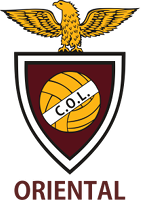History
In January 1936, Rui de Seixas, then-president of Chelas Football Club, first raised the idea of creating a single club that represents the entire eastern part of the city of Lisbon, but he was heavily criticized for it, causing him to give up the idea almost immediately. [1]
In April 1946, at a coffee shop, the idea of a merger is first brought up by José Marques de Oliveira, then vice-president of Chelas FC, to journalist Arthur Ines. In July 1946, the merger was voted on, with the board of directors of the three clubs: Os Fosforos, Marvilense, and Chelas, approving the project by a majority vote of 90%, and a few days later, the club was officially created by the merger of three clubs: Grupo Desportivo Os Fósforos, Marvilense Futebol Clube, and Chelas Futebol Clube. The club's colors (red shirt, white shorts, and socks in both colors) was also formally defined in the statutes, as well as the emblem, which is a mix of the old emblems of the three clubs. [1]
The club's first game was on 15 September 1946 against reigning champion Belenenses, losing 2–1. [1] The clubs first season was the 1946–47 season, finishing seventh in the league table of the second tier, which also included a freak 6–1 victory against Porto. [2] In the 1949–50 season, Oriental won the league title in the Segunda Divisão and achieved direct promotion to the highest division of Portuguese football. The following season Oriental finished fifth in the first division, its highest position to date. [2] For the rest of the 1950s, Oriental bounced between the first and second divisions, but won the league title multiple times, like in 1953 and 1956. In 1957, Oriental was relegated again, and was forced to stay in the second tier for sixteen years until achieving promotion again in 1973. Two years later, the club was relegated again, and in 1977 a stand collapsed at Estadio Engenheiro Carlos, which was considered a key factor in the club's relegation to the third tier for the first time in their history.
In 2001, the club was relegated to the fourth division, but returned to Terceira Divisão at the first attempt. The club spent the next decade between the fourth and third divisions. Oriental became one of the founders of the new Campeonato Nacional de Seniores in 2013, and at the end of the season they won first place in their promotion group, returning to the Portuguese second tier for the first time since 1989, when the tier was unified after years of being regionalized. [2]
This page is based on this
Wikipedia article Text is available under the
CC BY-SA 4.0 license; additional terms may apply.
Images, videos and audio are available under their respective licenses.
